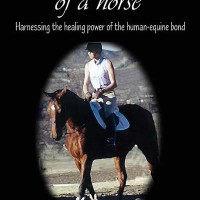While conducting a group recently, I was struck by how tentative the members were when I asked the question, “How approachable do you think you are?” Of course, I was asking the members to tell each other.
Resistance to authenticity is a natural effect of being human. We all engage in the habit of wanting to protect ourselves form the potential negative impact of THE TRUTH. Of course, the truth we are speaking of is really only our perception, or our truth. Yet this inherent tendency to avoid revealing what we really think impairs social relationships greatly. How is it that if a person are protected from others’ perceptions of him/her that any necessary behavioral adjustments can be made?
It was precisely at that moment when I recalled asking the same question in the middle of an arena with a big fuzzy nose nuzzling my shoulder. But this time I wasn’t asking the other group members to disclose the answer, I was asking the horse.
After asking the participants to spread throughout the arena, I then let the horse loose and stepped back to observe his behavior. While he did make some movement toward every single person in the arena, his behavior was distinctly different with each one.
With some people he approached and then quickly retreated, while with others he stayed a bit longer, curiously nuzzling their arms, midsections or even a face or two. In each instance, I noted the horse’s attitude toward the client. Was he wary? Nervous? Disinterested? Curious? Protective? Then collecting the group members together in the center of the arena I asked each one about the way the horse interacted with them.
My questions included: “If the horse was displaying some hesitation about approaching you, what, in you, do you think he could be responding to?”, “If the horse was acting in a protective way toward you, can you think of something in yourself that needs protection?” and “If the horse was leaving you alone, do you sometimes feel that you do need to be left alone?”
For each client, the horse’s response identified a hidden part of the self, and when I posed the question to the group, “Is this something that you also experience with the client?”, the answer was a profound “Yes.” However, when I asked my second question, “Is this something that you would readily share with the client?”, the answer was a profound “No.”
And there we had the discrepancy between what we experience with another person and what we might share with that person about that experience. For filling in this gap, we could only thank the horse.
Best,
Claire Dorotik LMFT

Being approachable depends upon how a person would really react in front of a horse. Sometimes, horses can be steady and on other times, not. It’s best to learn how to be the best person to ride a horse first and then go back from learning how to train a horse. Know everything first.